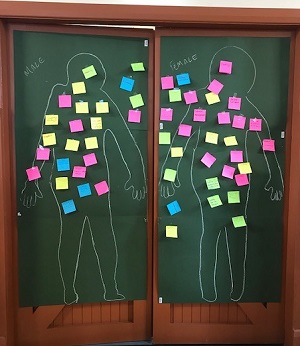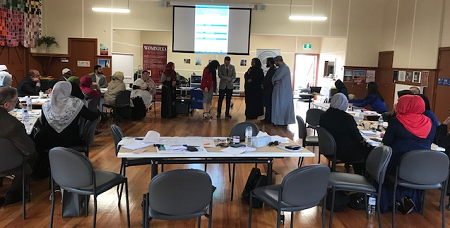24 April 2019
What a Success! Over 30 Muslim Leaders enjoyed the Family Violence Upskilling for Imams & Community Leaders 2019 event on 24th & 25th April 2019 organised in partnership with Board of Imams Victoria (BOIV), inpsiredNAFSi, Centre for Islamic Thought & Education (CITE), University of South Australia and funded by Victoria Government. Dr Nada Ibrahim was contracted to lead this program and deliver it. This program has been piloted in Feb 2018 with the Brisbane Muslim Community at great success.
The 2-day intensive event, included a combination of presentations and workshop-based individual, paired and group activities. The sessions were co-facilitated by Dr Nada Ibrahim and Aunty Debra Bennet from Relationships Australia Queensland. We thank Allah and the BOIV especially Sheikh Saleem Nawas and Sheik Mostafa for all their efforts in making this a successful event. We thank all the table facilitators, admin staff and volunteers who worked tirelessly to put this event together. We also thank every Imam/Leader of the Melbourne Muslim community who participated to make this a hugely successful event alhamdulillah.
Imams/Leaders benefitted by being upskilled with knowledge and practical skill on strength-based language; identifying men's and women's roles (see gender role image) from the perspectives of country-of-origin, culture-of-origin, religion-of-origin and family-of-origin and the challenges in doing so; trauma-informed practice; myths surrounding FV; privilege and its erosion for FV victims; internal & external voices of FV victims, Iceberg models on gender inequality; understanding FV dynamics and statistics (including those for Australian Muslim community); strengths of Muslim communities and families based on social justice values, community & diversity, family & marriage, respect & compassion; FV response in family, workplace, community & cyber spaces (see Understanding family violence in workplace roleplay image); reporting FV and barriers associated with accessing Australian criminal justice system; FV best practices and associated challenges based on the perspectives of general practitioner, police, service provider and magistrates court when working with victims of violence; developing rehearsed plan when responding to FV in Muslim communities; legislation and duty of care for Community Leaders when responding to FV; importance of collaboration when working with other agencies, Islam's view about FV and discussions on Quran 4:34; developing a strategy on how leaders can break cycle of violence, how they can educate themselves and their communities on FV, creating safer families and homes and creating responsive workplaces and communities.
Evaluations suggest that participants particularly enjoyed the interactive nature of the workshop and the activities that engaged them. The professional presentation panel was a big success including the roleplay that followed demonstrating best practices by Imam, general practioner, Victoria Police, service provider and Victoria Magistrates Court.

Gender role

Understanding family violence in workplace roleplay
Any interest in such training can be directed to Dr Nada Ibrahim on Nada.Ibrahim@unisa.edu.au




